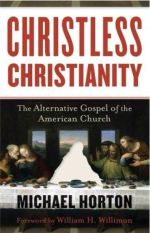 Here we are in the North American church—conservative or liberal, evangelical or mainline, Protestant or Catholic, emergent or otherwise—cranking along just fine, thank you. So we’re busy downsizing, becoming culturally relevant, reaching out, drawing in, making disciples, managing the machinery, utilizing biblical principles, celebrating recovery, user-friendly, techno savvy, finding the purposeful life, practicing peace with justice, utilizing spiritual disciplines, growing in self-esteem, reinventing ourselves as effective ecclesiastical entrepreneurs, and, in general, feeling ever so much better about our achievements.
Here we are in the North American church—conservative or liberal, evangelical or mainline, Protestant or Catholic, emergent or otherwise—cranking along just fine, thank you. So we’re busy downsizing, becoming culturally relevant, reaching out, drawing in, making disciples, managing the machinery, utilizing biblical principles, celebrating recovery, user-friendly, techno savvy, finding the purposeful life, practicing peace with justice, utilizing spiritual disciplines, growing in self-esteem, reinventing ourselves as effective ecclesiastical entrepreneurs, and, in general, feeling ever so much better about our achievements.
Notice anything missing in this pretty picture? Jesus Christ!
Jesus Christ indeed. In Flannery O’Connor’s wild, wickedly funny novella, Wise Blood, her antipreacher preacher, Hazel Motes, preaches a “Church without Christ” where nobody sheds blood, and there’s no redemption “’cause there ain’t no sin to redeem,” and “what’s dead stays that way.”1 I always thought O’Connor’s book an outrageous, wildly improbable satire. Then Mike Horton comes along and names the “Church without Christ” as our pervasive ecclesial reality. Horton accuses us of achieving what has never transpired in the entire history of Christendom. Somehow we’ve managed to preach Christ crucified in such a way that few are offended, a once unmanageable God suddenly seems nice, and the gospel makes good sense—as we are accustomed to making sense. We just can’t stand to submit to the machinations of a living God who is determined to have us on God’s terms rather than ours, so we devise a god on our own terms. Flaccid, contemporary Christianity is the result.
This is a tough book, but well written, fast paced, and wonderfully grounded in classical Reformation Christianity. Our poor old, compromised, accommodating church is here subjected to withering theological critique. Here the roots of our current theological malaise are exposed and we see the wrong turns we took when we began taking ourselves more seriously than God. The boredom and conventionality of the contemporary church are assaulted. Michael Horton diagnoses our trouble in stunning, unavoidable candor. Therapeutic, utilitarian deism is named, nailed, and and defeated with the best weapon God has given us—the gospel of Jesus Christ. Presumptively evangelical Christianity is exposed as the latest recruit to the cause of insipid, culturally compromised liberalism. I am judged in the process. Robert Schuller’s vapid ecclesiology is us all over. My sermons are only slightly less silly and compromised than Joel Osteen’s. Mea culpa. Mea culpa. Mea culpa.
But this book is not all critique. Horton mounts a wonderfully hopeful argument. His sermon is not only tough but also invigorating and empowering. In the process of reading this Jesus-induced polemic, you will be recalled to the power of the gospel. God forgive us for selling out our great intellectual treasure—the gospel of God with us—for a mess of psychobabble and pragmatic, utilitarian, self-help triviality.
Horton joyfully reminds us that theological thinking is so much more interesting than all of the distractions that keep us busy but malnourished. The peculiar Good News of Jesus Christ is better than anything William James or Charles G. Finney and their innumerable heirs have to offer. The determination of God in Jesus Christ to love sinners and to enlist them in the invasion that is his kingdom is so much more relevant to our true condition than our inclination to meet the felt needs of narcissistic North American consumers.
Have a wonderful adventure reading this book. Enjoy being enticed into the strange new world of vibrant Christianity in Horton’s spirited gospel recovery operation. In the process, you will be liberated from our cultural captivity so that again you will be free to worship, in word and deed, the risen Christ.
Let’s put Christ back in Christianity.
William Willimon
Bishop of the United Methodist Church
Birmingham, Alabama
To purchase this book, go here: http://www.monergismbooks.com/Christless-Christianity-The-Alternative-Gospel-of-the-American-Church-p-18103.html

Leave a Reply